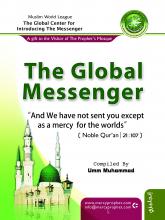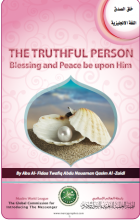The Prophet of Mercy Website
Muslim World League - Global Commission for Introducing the Messenger
The sense of responsibility. The early Companions were fully aware of the daunting responsibility they were expected to shoulder. They were also convinced that those charges were inescapable even though they were being persecuted for fear of the far-reaching ramifications, and the horrible impact that humanity would suffer in case they shirked their obligations.
Unwavering Belief in the truth of the Hereafter. This was the corner-stone that strengthened their sense of responsibility. There was a deep certainty established through the light of their religion that one day they would have to rise on the Day of Resurrection and account for all worldly deeds, small or big. They were sure that their future in the other world would depend wholly on their acts in their provisional life on earth, either to everlasting Garden (Paradise) or perpetual chastisement in Hell. Their whole life was divided between hope for Allâh’s mercy and fear of His punishment.
“… Who give that (their charity) which they give (and also do other good deeds) with their hearts full of fear (whether their alms and charities, etc., have been accepted or not), because they are sure to return to their Lord.” [23:60]
They had already known that life with all its amenities and pains was worthless when compared with the Hereafter. Such deep convictions brought about in them a sense of indifference to all troubles and hardships that attended their life.
The Qur’ân. The verses and chapters of the Noble Qur’ân were attractively, forcefully and successively revealed at that gloomy and critical stage, supporting and advancing arguments on the truth and soundness of the principles of Islam, round whose axis the whole Call of Muhammad Õáì Çááå Úáíå æÓáã was revolving. They constituted the immune basis upon which the best and most wonderful Divinely decreed society was to be established. The Qur’ânic verses served also to excite the feelings of the believers, strengthen their selves on their course of patience and endurance and introduce them to the most purposeful examples and suggestive instructions:
“Or think you that you will enter Paradise without such (trials) as came to those who passed away before you? They were afflicted with severe poverty and ailments and were so shaken that even the Messenger and those who believed along with him said, ‘When (will come) the Help of Allâh?’ Yes! Certainly, the Help of Allâh is near!” [2:214]
“Alif-Lam-Mim. Do people think that they will be left alone because they say: ‘We believe’, and will not be tested. And We indeed tested those who were before them. And Allâh will certainly make (it) known (the truth of) those who are true, and will certainly make (it) known (the falsehood of) those who are liars, (although Allâh knows all that before putting them to test).” [29: 1-3]
Mere lip profession of Faith is not enough. It must be tried and tested in the real turmoil of life. The test will be applied in all kinds of circumstances, in individual life and in relation to the environment around us to see whether we can strive constantly and put the Lord above self. Much pain, sorrow and self-sacrifice may be necessary, not because they are good in themselves, but because they will purify us, like fire applied to a goldsmith’s crucible to burn out the dross.
These verses also constituted an irrefutable answer to the false allegations of the disbelievers, and a clear ultimatum that smacked of the horrible consequethat would ensue in case they persisted in their disbelief. On the other hand, the Noble Qur’ân was leading the Muslims to a new world and enlightening them as to its features, the beauty of Lordship, the perfection of Godship, the impact of kindness and mercy and the manifestations of the yearned for Allâh’s pleasure. They implicitly connoted meaningful messages carrying glad tidings of definitely approaching Divine Mercy leading to eternal bliss in a blissful Garden (Paradise). They, at the same time, envisaged the end of the tyrants and disbelievers who would be brought to Divine Justice and then dragged through the Fire where they would taste the touch of Hell.
Glad tidings of success. Ever since the time they experienced the adversities of life, the Muslims had been certain that entrance into the fold of Islam did not entail involvement into hardships or digging one’s own grave. They had been aware that the Islamic Call had one goal, viz extermination of pre-Islamic tradition and destroying its iniquitous system, to go on parallel lines with extending its influence allover the earth and holding in firm control the political situation worldwide to lead humanity along a course conducive to Allâh’s Pleasure, and perfect enough to rid people of worshipping Allâh’s servant to worshipping Allâh, Himself. Glad tidings of this sort were being revealed sometimes explicitly and at other times implicitly, in a manner relevant to the situation. When the Muslims were forced to undergo constraints, or when their life was kept under continual restraint, there would be revealed verses telling identical stories of past Prophets with their people and the sufferings and pains they had experienced. The verses would also include suggestive clues to the final tragic end of the Makkan disbelievers envisaging their final perdition, yet and at the same time, bearing glad tidings to the believers and promising the true
******






